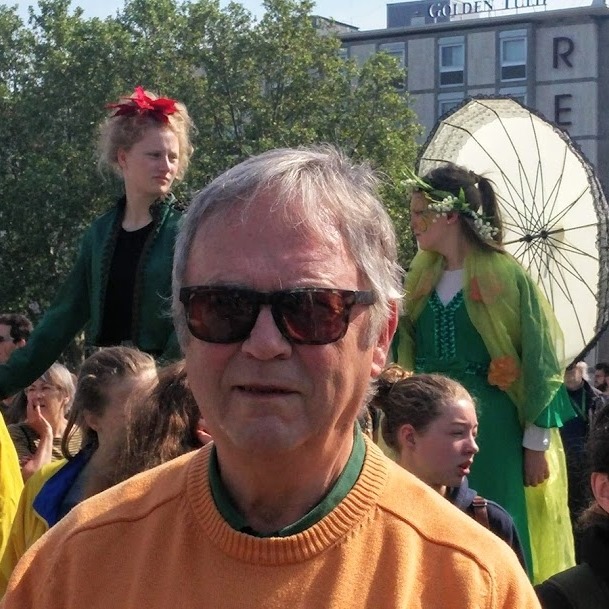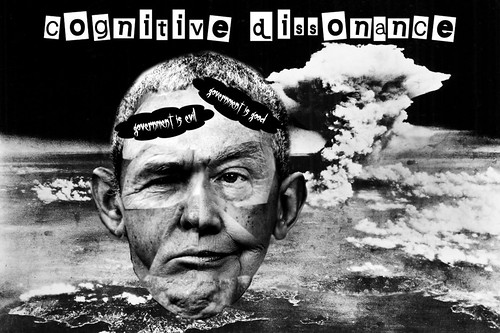[This is slightly revised from an article published at 911blogger.com in 2008 and in my book The Transparent Conspiracy(2010). It seems even more relevant today as the so-called "deep state" not just openly but brazenly, and in my opinion transparently and intentionally in order to keep us feeling forever helpless, displays itself in Gaza and Ukraine. I have added some links and changed some of the wording.]
Somewhere between George Bush and Noam Chomsky, who believe the 9/11 Commission Report, and David Ray Griffin, who believes "the Bush-Cheney administration orchestrated 9/11" (Christian Faith and the Truth Behind 9/11, 2006, p. vii-viii, ), there is Peter Dale Scott in The Road to 9/11: Wealth, Empire, and the Future of America (2007).
Scott doesn't say who did it, but as Ola Tunander puts it:
Peter Dale Scott exposes a shadow world of oil, terrorism, drug trade and arms deals, of covert financing and parallel security structures - from the Cold War to today. He shows how such parallel forces of the United States have been able to dominate the agenda of the George W. Bush Administration, and that statements and actions made by Vice President Cheney and Defense Secretary Rumsfeld before, during and after September 11, 2001, present evidence for an American "deep state" and for the so-called "Continuity of Government" in parallel to the regular "public state" ruled by law. Scott"s brilliant work not only reveals the overwhelming importance of these parallel forces but also presents elements of a strategy for restraining their influence to win back the "public state," the American democracy.
This is not very different from the more widely held "rogue network" theory described, for example, by Webster Tarpley, as "an outlaw network of high officials infesting the military and security apparatus of the United States and Great Britain" (9/11 Synthetic Terror, 2007, p. vi) Tarpley sees this network as "ultimately dominated by Wall Street and City of London financiers," but many other candidates have been proposed (Bilderbergers, Bohemian Grove, Skull and Bones, Illuminati, CFR, CIA, Mossad, Federal Reserve, World Economic Forum, etc.).
What these two points of view have in common, if indeed they are different at all, is the idea that there is, or still is, a "public state" (or "non-rogue" network) at all. This sounds comforting, to the extent that it encourages us to think that if we can just expose and get rid of the bad guys, we can "win the country back." The latter expression brings us all the way back into mainstream politics, where anyone dissatisfied with the status quo can complain about the country having gone to the dogs and being desperately in need of change.
It is along this continuum that we lose Chomsky and other advocates of a "structuralist" or "institutional" approach, which they oppose to "conspiracy theory" generally. The system cannot be fixed, they say, by superficial reforms, or by getting rid of the bad guys, because it is based on capitalist imperialism and the profit motive. Even if the "deep state" were exposed and removed, things would not improve significantly because the public state is the real killer. Chomsky's entire (political) oeuvre is dedicated to showing how the US government (and its allies) wreak havoc in the world, not by conspiracy but openly and consistently as the logical and predictable consequence of the economic system it serves.
I think both points of view are flawed. Why Chomsky et al. refuse to acknowledge the evidence for high-level government complicity in "deep state" events like the JFK assassination and 9/11 is simply not comprehensible. They fit easily (and politically very effectively) into a "structural" analysis: both events precipitated imperialist wars -- the latter undeniably (the War on Terror), the former arguably (Vietnam).
On the other hand, is this notion of a coexisting deep and public state not precisely the state of doublethink George Orwell described in 1984 -- "holding two contradictory beliefs in one's mind simultaneously, and accepting both of them"? How is it possible, logically, to propose two things at the same time that, as it seems to me, are mutually exclusive? If the deep state exists, there can be no public state, by definition. The same is true of the rogue network. There can be no rogue network within the government controlling the government, because if that is the case the rogue network is the government.
This is not "semantics." Scott is not talking about the public face, the propaganda mask, that "bad" governments use to disguise their evil nature. There would be nothing new about that. He is talking about two governments ("states"), a good one and a bad one, that are so intertwined they can hardly be told apart, like Jekyll and Hyde. This is what Scott's oeuvre is all about -- showing us how closely intertwined they are. My problem with this is that precisely because they are so intertwined, I see no point in trying to distinguish them.
Worse, Scott's theory in the end exonerates the very institutions (CIA, FBI, military intelligence, etc.) he impugns. Like John Newman, who can present a mountain of evidence proving that Oswald was a CIA agent without implicating the CIA as an institution (Oswald and the CIA, 1995), Scott does not locate the deep state in the CIA or any other government agency, or in the government at all, since what he calls the "overworld" extends far beyond the US government into organized crime, international banking and finance, transnational corporations, foreign intelligence agencies, etc. Thus "9/11 was an inside job," for Scott, does not mean the (US) government did it. Ditto for JFK, and all other "deep events."
As long as this doublethink holds, one is paralyzed. One cannot blame the government, or agencies of the government, because they didn't do it. Despite the overwhelming evidence tying them to all sorts of misdeeds, they are innocent as institutions because they are, after all, part of the "public state." This is where Newman leaves us, and it is where Scott leaves us. Maybe there is something about being a former intelligence officer (Newman) or a (Canadian) diplomat (Scott) that prevents them from taking the final, logical step. If everything, or even half, of what they say is true, the government did do it, and only the government can solve the so-called "mysteries" and rectify the situation, whereupon it follows that we must try to remake the government into a true "res publica." Rather than exonerate the CIA as an institution, for example, it should be completely reformed (or abolished) as an institution. Since this can probably not be done without reforming the overarching institution, the government, of which it is a part, we can now rejoin Chomsky et al. in calling for fundamental change (not to say revolution). I wonder if Maj. Newman and Prof. Scott would be with us on that one.
N.B. Here are a few quotes from Scott's book that I think illustrate my point:
But the consequences of global inequality cannot be shielded from Americans forever, as this country learned with a shock on September 11, 2001 (p. 252).
In the wake of 9/11, Americans were encouraged not to think of al Qaeda with compassion, or even to consider the reasons why jihadists had attacked the United States (p. 261).
...the immoral folly of Vietnam (p. 253).
...we can talk of a visionary realism: the need to bring a fresh, visionary alternative from outside to bear on institutions that, although worthy of preservation and respect, are clearly not working as intended (p. 254).
The first two quotes make it clear that Scott is much nearer to Chomsky (and George Bush) on 9/11 than to David Griffin. Scott does not think 9/11 was an inside job. All he says is that the government hasn't told the whole truth. "Jihadists" did it.
The war in Vietnam was "immoral," of course, but not from the point of view of the warmongers, and "folly" implies that it was a "well-intentioned mistake," which is the official propaganda line on that history. Chomsky would disagree, and so do I. The war in Vietnam served the economic and political interests (destroying the threat of a bad example, i.e. an independent Vietnam) of the ruling class (aka power elite, military-industrial complex, Wall Street, etc.). See Chomsky for this argument; he makes it better than I can. Where Chomsky and I differ (and I just don't know about Scott) is that I think JFK was killed in order to get him out of the warmongers' way.
Given that Scott, like George Bush and Noam Chomsky, believes that "jihadists" were responsible for 9/11 and (unlike Chomsky but like Bush) that Vietnam was an "immoral folly," it is not surprising that he considers "institutions" such as the the CIA "worthy of preservation and respect." Even if he does NOT think these institutions were behind the JFK assassination and 9/11 (et al.), this is an extraordinarily naive statement just on the basis of what he himself has documented in his many books and articles.
Scott must know perfectly well that if our "institutions," in sum, our government (his "public state"), were still in anything remotely like a state of health, or anything remotely resembling the "public state" it is said to be, the crimes of 9/11, JFK, etc. would have been solved long ago. If these institutions were still "legitimate" in this sense, sure, there could be "rogue elements" that might even manage to kill a president or fly airplanes into buildings. But they could not have done these things (in the latter case bringing the US Air Force to its knees) and gotten away Scot free (no pun intended), leaving them to haunt the history books and provide a seemingly inexhaustible source of true-crime "murder mystery" material. A legitimate government would have solved the crimes (and others) long ago.
Scott is trying to hang on to the illusion that the government is still (if it ever was) the "public state" he imagines (and which we have all been more or less brainwashed into believing it is (if we grew up in the US). This is debilitating because we need to know where we stand before we can hope to do anything about it. I think the perpetrators want (some of) us to know, too, in order to intimidate us into feeling forever cowed and helpless, but that strategy could backfire if we ever break out of the doublethink bind.
(Article changed on May 03, 2024 at 12:59 PM EDT)






